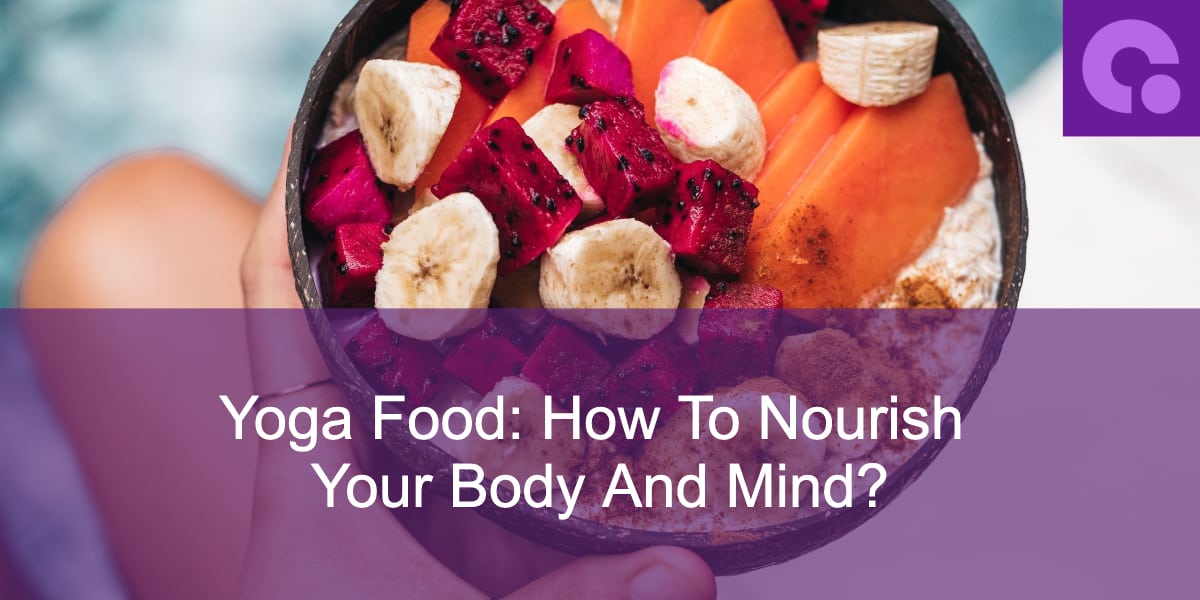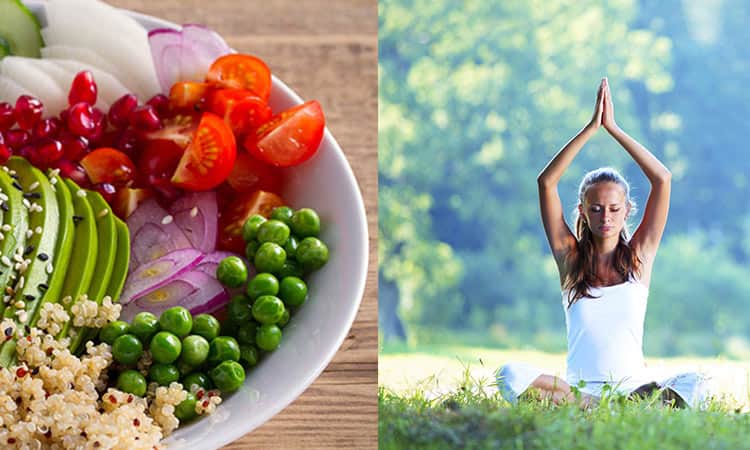Yoga is an ancient practice that involves physical postures, breath control, and meditation to enhance overall well-being. While many people associate yoga with exercise, it is also important to consider the role of nutrition in supporting a healthy and balanced yoga practice.
In this article, we’ll explore the concept of yoga food, discussing the importance of nutrition for yoga, the yogi diet, and what yogis eat to fuel their bodies and minds.
Importance of Nutrition for Yoga:
Eating a healthy and balanced diet is crucial for supporting a regular yoga practice. The foods we eat have a direct impact on our physical and mental health, and can affect our energy levels, focus, and mood.
A well-rounded diet that includes plenty of fruits, vegetables, whole grains, lean proteins, and healthy fats can help provide the nutrients our bodies need to stay energized and focused during yoga sessions.
Yogi Diet:
The yogi diet is a plant-based diet that emphasizes whole, nutrient-dense foods. Many yogis choose to follow a vegetarian or vegan diet, as it aligns with the principles of ahimsa (non-harming) and satya (truthfulness) in yoga philosophy.
However, it’s important to note that not all yogis follow a vegetarian or vegan diet, and it’s ultimately up to each individual to determine what works best for their body and lifestyle.
Great Yoga Mat Towel – Yogitoes
About this product:
- Anti-Slip Bottom: Patented Skidless Technology with silicone nubs for superior grip during hot and sweaty yoga.
- Yoga Support: Ultra absorbent, quick-drying, and sustainable Yogitoes in beautiful designs.
- Eco-Friendly: Made from at least four recycled plastic bottles, reducing energy consumption, and free from harmful dyes.
What Do Yogis Eat?
Yogis eat a wide variety of foods to support their physical and mental health. Here are some examples of foods that are commonly included in a yogi diet:
- Fruits and vegetables: Fresh produce is a staple of the yogi diet, as it provides essential vitamins, minerals, and antioxidants. Yogis often choose locally-grown, organic fruits and vegetables whenever possible.
- Whole grains: Whole grains such as brown rice, quinoa, and whole wheat pasta are rich in fiber and complex carbohydrates, providing sustained energy throughout the day.
- Legumes: Lentils, chickpeas, and other legumes are a great source of plant-based protein and fiber.
- Nuts and seeds: Almonds, cashews, pumpkin seeds, and other nuts and seeds provide healthy fats, protein, and essential micronutrients.
- Herbal teas: Many yogis enjoy sipping on herbal teas such as ginger, chamomile, and peppermint, which can help calm the mind and aid digestion.
In addition to these foods, yogis also prioritize mindful eating practices such as eating slowly, savoring each bite, and avoiding distractions such as phones and computers while eating. By paying attention to their bodies and making intentional choices about what they eat, yogis can cultivate a deeper connection between their food and their overall well-being.

Nutrition for Yoga:
While the yogi diet is a great foundation for supporting a healthy yoga practice, it’s also important to consider the specific nutrients that can support physical performance and mental focus during yoga sessions. Here are some examples of key nutrients and their benefits:
- Protein: Protein is essential for building and repairing muscle tissue, which is especially important for yogis who practice frequently. Good sources of plant-based protein include legumes, nuts, seeds, and tofu.
- Carbohydrates: Carbohydrates provide the body with glucose, which is the primary fuel source for physical activity. Whole grains, fruits, and vegetables are all good sources of complex carbohydrates.
- Omega-3 fatty acids: Omega-3s are a type of healthy fat that can reduce inflammation and support brain health. Good sources of omega-3s include flaxseeds, chia seeds, walnuts, and fatty fish such as salmon.
- Vitamin D: Vitamin D is important for bone health and can also support immune function. Yogis who practice indoors or live in areas with limited sun exposure may benefit from a vitamin D supplement or vitamin D-fortified foods such as plant-based milks and cereals.
- B vitamins: B vitamins, including thiamine, riboflavin, and niacin, play a key role in energy metabolism and can help support mental focus during yoga sessions. Good sources of B vitamins include whole grains, legumes, leafy greens, and fortified cereals.
In addition to these nutrients, it’s important to stay hydrated during yoga sessions by drinking plenty of water and electrolyte-rich fluids such as coconut water. Proper hydration can help prevent cramping and fatigue, and can support physical and mental performance.
Comparing Different Foods for Yoga:
To help illustrate the importance of nutrient-dense foods for yoga, let’s compare two hypothetical meals: one that is high in processed foods and one that is high in whole, plant-based foods.
Meal 1: Processed Foods
- Frozen pizza
- Soda
- Chocolate candy bar
Meal 2: Whole, Plant-Based Foods
- Brown rice
- Lentil and vegetable stir-fry
- Side salad with mixed greens, cherry tomatoes, and avocado
- Herbal tea
While Meal 1 may be convenient and satisfying in the moment, it lacks the nutrients needed to support physical and mental well-being during a yoga session. In contrast, Meal 2 provides a variety of whole, nutrient-dense foods that can help fuel the body and mind. By making intentional choices about what we eat, we can support our yoga practice and overall health.
Some Great Recipes For Yogis
Here are some plant-based recipes that can be great additions to a yogi’s diet:
Green Smoothie Bowl
Ingredients:
- 1 banana
- 1 cup frozen mixed berries
- 1/2 avocado
- 1 cup spinach
- 1/2 cup almond milk
- Toppings of choice (such as sliced banana, berries, granola, chia seeds)
Instructions:
- Blend the banana, mixed berries, avocado, spinach, and almond milk in a blender until smooth.
- Pour the smoothie into a bowl.
- Top with your choice of toppings, such as sliced banana, berries, granola, and chia seeds.
- Enjoy immediately.
Lentil and Vegetable Stir-Fry
Ingredients:
- 1 cup brown lentils, rinsed and drained
- 2 cups water
- 1 tbsp coconut oil
- 1 onion, chopped
- 2 garlic cloves, minced
- 1 bell pepper, chopped
- 1 zucchini, chopped
- 1/2 cup frozen peas
- 1 tbsp soy sauce
- Salt and pepper, to taste
Instructions:
- In a medium saucepan, bring the lentils and water to a boil. Reduce heat, cover, and simmer for 20-25 minutes, or until the lentils are tender.
- While the lentils are cooking, heat the coconut oil in a large skillet over medium heat.
- Add the onion and garlic and sauté for 2-3 minutes, or until fragrant.
- Add the bell pepper, zucchini, and frozen peas to the skillet and sauté for 5-7 minutes, or until the vegetables are tender.
- Add the cooked lentils to the skillet and stir to combine.
- Add the soy sauce and salt and pepper to taste.
- Serve hot.
Chickpea Salad
Ingredients:
- 1 can chickpeas, rinsed and drained
- 1/2 red onion, chopped
- 1/2 cucumber, chopped
- 1/2 red bell pepper, chopped
- 1/4 cup fresh parsley, chopped
- 1/4 cup lemon juice
- 2 tbsp olive oil
- Salt and pepper, to taste
Instructions:
- In a large bowl, combine the chickpeas, red onion, cucumber, red bell pepper, and parsley.
- In a separate bowl, whisk together the lemon juice, olive oil, salt, and pepper.
- Pour the dressing over the salad and stir to combine.
- Serve chilled.
Conclusion:
Yoga is a holistic practice that involves nourishing both the body and mind. By prioritizing a healthy and balanced diet, yogis can support their physical performance and mental focus during yoga sessions. The yogi diet emphasizes whole, plant-based foods, and encourages mindful eating practices.
In addition to the yogi diet, specific nutrients such as protein, carbohydrates, omega-3s, vitamin D, and B vitamins can also support physical and mental performance during yoga sessions. By making intentional choices about what we eat, we can cultivate a deeper connection between our food and our overall well-being.
Originally posted 2023-05-01 17:26:13.
Co-founder of Yogalian.com. Over 8 years of sharing yoga and mindfulness across Vietnam and online. Passionate about bringing body awareness and peace into daily life.



